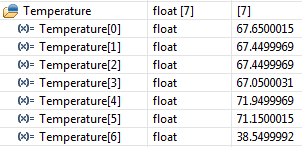Hello sir.
We are using BQ76952 for battery management with STM32 using I2C protocol,but unfortunately we can't get the actual temperature of Thermistor. We use 18k thermistor (10k in room temperature). We connect 6 thermistors on TS1, TS3, HDQ, CFETOFF, DDSG & DCHG pin. But we get inaccurate values. After Temperature offsets (TS1TempOffset, CFETOFFTempOffset, TS3TempOffset, HDQTempOffset, DCHGTempOffset, DDSGTempOffset) we are getting values average 70 degree C on each thermistor. But the real temperature should be near 30 degree C.
Internal temperature shows correct (IntTemperature 0x68).
Please help to solve this problem. Looking for positive reply.
Regards,
Subhrajit Majumder.



